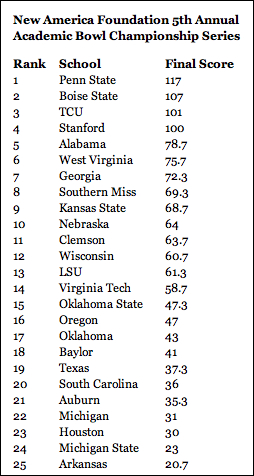Penn State Nittany Lions running back Michael Zordich (9) and linebacker James Van Fleet (54) prepare to take the field against Ohio State in Columbus, Ohio
Louisiana State University may again be the best team in the nation going into the recently announced college bowls, but when it comes to the football team’s academic performance, it’s a lower-than-middling No. 13. According to an analysis by the New America Foundation (NAF), only 48% of the school’s football players graduate within six years or less.
But the ironic news is that the team that topped the list is Penn State, whose football program, coached by the legendary Joe Paterno, was rocked by a sex-abuse scandal. According to the analysis, Penn State graduates 80% of its football players in six years or less and also shows no achievement gap between its black and white players, which NAF says is extremely rare for Division I football teams. (At LSU, by comparison, the team’s black players are 32% less likely to graduate than their white counterparts.) Winning the top honors in the academic bowl further proves the success of Paterno’s “grand experiment,” his idea that major-college athletes could contend for national championships while excelling in the classroom.
(PHOTOS: The Career of Joe Paterno)

New America Foundation
So this may be the only time in recent weeks we’ve had to admit — at least in this arena — that more schools should be doing what Penn State has done. NAF got into the business of compiling academic rankings as a way to increase the focus on college athletes’ academic success (or lack thereof). “We would hope athletes would be leaving college with skills that could be used in a career after their sports career is over,” says Maggie Severns, a program associate with NAF. “But these days, it’s taken for granted that athletes, particularly football and basketball players, aren’t really focusing on their academic careers.”
(MORE: Doug Glanville: Silence in the Locker Room)
While the NCAA slightly increased its standards for academic performance earlier this year, the bar is still too low, Severns says. The reality of the situation is that for the vast majority of players, the skills they learn in the classroom are much more important than their athletic performance. After all, says Severns, “the majority of these kids won’t be making millions from playing professionally. Most athletes from Division I teams don’t end up going pro, and those that do often get cut after the first year or two.” Which means that student athletes nationwide — especially those at Arkansas and Michigan State, which ranked at the bottom out of 25 teams — should spend more time with their noses buried in academic books, not playbooks.
Webley is a staff writer at TIME. Find her on Twitter at @kaylawebley or on Facebook at facebook.com/kaylawebley. You can also continue the discussion on TIME’s Facebook page and on Twitter at @TIME.

